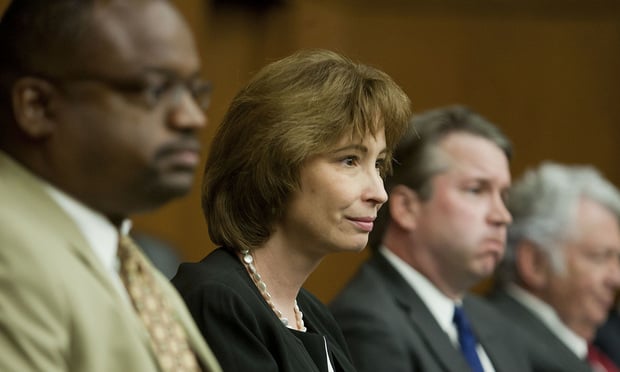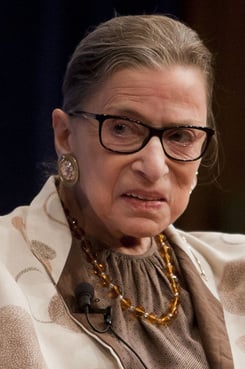DC Circuit's Patricia Millett, Who Backed Teen's Abortion Right, Finds Role Model in Ruth Bader Ginsburg
"J.D. came to the United States without legal documentation. That is not disputed. But the government cannot make a forced pregnancy the sanction for that action. J.D. retains her basic rights to personhood," Judge Patricia Millett wrote in her dissent. Here's a snapshot of the foundation of Millett's writing.
October 23, 2017 at 06:24 PM
8 minute read
 Patricia Millett.
Patricia Millett. Of the two women nominated in 2013 to seats on the U.S. Court of Appeals for the D.C. Circuit, conservative and anti-abortion groups objected most vocally to civil rights litigator and law professor Cornelia Pillard. But it was former appellate specialist Patricia Millett who wrote the searing abortion rights dissent last week on behalf of a pregnant immigrant teen that rocketed across social media as a must-read.
In Garza v. Hargan, the government argued that its refusal to “facilitate” the detained teen's abortion did not present an undue burden on her right to an abortion—assuming she had such a right as someone who had entered the country illegally.
Millett dissented from the 2-1 panel ruling that blocked the teen, detained in Texas, from getting an abortion immediately and gave the government until Oct. 31 to find her a sponsor. She wrote in her 10-page dissent:
“Forcing her to continue an unwanted pregnancy just in the hopes of finding a sponsor that has not been found in the past six weeks sacrifices J.D.'s constitutional liberty, autonomy, and personal dignity for no justifiable governmental reason. The flat barrier that the government has interposed to her knowing and informed decision to end the pregnancy defies controlling Supreme Court precedent.”
Millett was on the D.C. Circuit panel with Republican-appointed Judges Brett Kavanaugh and Karen LeCraft Henderson. The American Civil Liberties Union on Sunday urged the full D.C. Circuit to reconsider the panel decision. The ACLU prominently pointed to Millett's dissent. Several states, participating as friends of the court, on Monday told the D.C. Circuit they “agree” with Millett.
Two Supreme Court cases, according to Millett, should have decided the teenager's case: Planned Parenthood of Southeastern Pennsylvania v. Casey, the 1992 decision that reaffirmed a woman's right to abortion, and the 2016 opinion in Whole Woman's Health v. Hellerstedt, striking down Texas restrictions on clinics that perform abortions.
“What is forcing J.D. to carry on this pregnancy is not J.D.'s choice,” Millett wrote. “It is not Texas law. It is the federal government's refusal to allow an abortion to go forward. The government's refusal to release J.D. from custody is not just a substantial obstacle; it is a full-on, unqualified denial of and flat prohibition on J.D.'s right to make her own reproductive choice.”
There's little in Millett's experience at her former firm—Akin Gump Strauss Hauer & Feld—or her time on the bench that would predict her fiery analysis of the facts surrounding the teen's detainment. Millett's dissent “taught me things about her I didn't know,” said Thomas Goldstein of Washington's Goldstein & Russell, a former Akin Gump partner. Goldstein and Millett co-chaired the firm's Supreme Court and appellate practice.
“We worked together for years. She is not an ideologue,” Goldstein said Monday. “She is always straight down the middle. Any time a judge writes about abortion it can be fraught. It's clear she feels strongly about the right involved. It will be really interesting to see how she leads the left on this. It's the most significant thing she has written.”
Millett's nomination to the D.C. Circuit garnered broad bipartisan support, including from seven former U.S. solicitors general of both parties, and she was described as “supremely qualified” and “unfailingly fair-minded.” At the same time, Republicans questioned Pillard over her academic writings on such topics as reproductive rights.
The foundation of Millett's dissent in the pregnant teen's case is perhaps manifest in her volunteer work on behalf of abused and homeless women and other powerless communities—and her connections to Justice Ruth Bader Ginsburg.
Ruth Bader Ginsburg as a Role Model
At a recent event on women in the Supreme Court, Millett spoke about her admiration for Ginsburg.
“I've told Justice Ginsburg if there had been no 'her,' there probably would have been no 'me.' She has been my role model. When I came on the D.C. Circuit, they have closets where you keep your robes and they keep the plaques of all the judges who preceded you. I begged and pleaded to get her closet because it meant so much to me.”
Ginsburg, a fierce defender as a women's rights litigator—and then later as a judge—brought on-the-ground knowledge to the court, Millett said. She noted, in particular, the case of a 13-year-old middle school girl who was strip-searched at school when suspected of having drugs.
“She was able to tell what it's like to be a teenage girl and what that feels like, and your sense of bodily integrity,” Millett said. “You can never know, but I think it had an important impact on the outcome of the case.”
 Ruth Bader Ginsburg
Ruth Bader GinsburgMillett developed a sense of the vulnerabilities of certain segments of society early in her legal career.
As a clerk to the late Judge Thomas Tang of the Ninth Circuit, Millett served weekly meals to the homeless on the streets of Phoenix. She also volunteered at a day care center devoted to children who lived in homeless or battered women's shelters and volunteered directly with the battered women's shelter.
During her time as assistant to the U.S. solicitor general in the U.S. Justice Department, she was a literacy tutor, an effort she continued for almost 20 years. Millett is among the leaders of most cases argued by a female lawyer at the Supreme Court.
In her answers to the Senate Judiciary Committee's questionnaire on her nomination to the D.C. Circuit, Millett said she was engaged in the homeless ministries through her church, such as sleeping overnight as a monitor, providing fresh produce to local homeless shelters and visiting sick, grieving and home-bound members of the church community.
Pro Bono Advocate for Refugees
In private practice in 2009, Millett helped draft an amicus brief in the Supreme Court case Negusie v. Mukasey on behalf of Human Rights First, Human Rights Watch, the American Immigration Lawyers Association and the U.S. Commission for Refugees and Immigrants.
The issue in Negusie, Millett and Akin partner Steven Schulman wrote, was “whether a refugee who was forced, by threats of severe harm or violence, to inflict harm on another, must be excluded from asylum, and may be returned to a country where his life and freedom would be threatened, without regard for the fact that he acted under duress.”
Failing to consider duress, Millett and Schulman argued, violated “the text of the statute, negates the humanitarian objectives” underpinning the Refugee Act of 1980, and also violated treaty obligations. Their brief offered the court examples of children who were forced into military service and suffered torture and sexual violence during their conscription.
The justices ruled for the asylum seeker.
Read more:
Morning Coats and First Arguments: Female SCOTUS Lawyers on Breaking Barriers
D.C. Circuit Declines to Allow Pregnant Undocumented Teen to Get Abortion, For Now
Female Lawyers Tell the Supreme Court About Their Own Abortions
Judges Reflect on Their Former Firm's Pro Bono Work
Patricia Millett Reflects on Clerking, Diversity
Where Women Lawyers Succeed: NLJ Scorecard Reveals Which Firms Make the Grade
This content has been archived. It is available through our partners, LexisNexis® and Bloomberg Law.
To view this content, please continue to their sites.
Not a Lexis Subscriber?
Subscribe Now
Not a Bloomberg Law Subscriber?
Subscribe Now
NOT FOR REPRINT
© 2025 ALM Global, LLC, All Rights Reserved. Request academic re-use from www.copyright.com. All other uses, submit a request to [email protected]. For more information visit Asset & Logo Licensing.
You Might Like
View All

Trump's DOJ Delays Releasing Jan. 6 FBI Agents List Under Consent Order
3 minute read

Judge Grills DOJ on Trump’s Birthright Citizenship Executive Order
Trending Stories
- 1Jury Awards $3M in Shooting at Nightclub
- 2How Clean Is the Clean Slate Act?
- 3Florida Bar Sues Miami Attorney for Frivolous Lawsuits
- 4Donald Trump Serves Only De Facto and Not De Jure: A Status That Voids His Acts Usurping the Power of Congress or the Courts
- 5Georgia Hacker Pleads Guilty in SEC X Account Scam That Moved Markets
Who Got The Work
J. Brugh Lower of Gibbons has entered an appearance for industrial equipment supplier Devco Corporation in a pending trademark infringement lawsuit. The suit, accusing the defendant of selling knock-off Graco products, was filed Dec. 18 in New Jersey District Court by Rivkin Radler on behalf of Graco Inc. and Graco Minnesota. The case, assigned to U.S. District Judge Zahid N. Quraishi, is 3:24-cv-11294, Graco Inc. et al v. Devco Corporation.
Who Got The Work
Rebecca Maller-Stein and Kent A. Yalowitz of Arnold & Porter Kaye Scholer have entered their appearances for Hanaco Venture Capital and its executives, Lior Prosor and David Frankel, in a pending securities lawsuit. The action, filed on Dec. 24 in New York Southern District Court by Zell, Aron & Co. on behalf of Goldeneye Advisors, accuses the defendants of negligently and fraudulently managing the plaintiff's $1 million investment. The case, assigned to U.S. District Judge Vernon S. Broderick, is 1:24-cv-09918, Goldeneye Advisors, LLC v. Hanaco Venture Capital, Ltd. et al.
Who Got The Work
Attorneys from A&O Shearman has stepped in as defense counsel for Toronto-Dominion Bank and other defendants in a pending securities class action. The suit, filed Dec. 11 in New York Southern District Court by Bleichmar Fonti & Auld, accuses the defendants of concealing the bank's 'pervasive' deficiencies in regards to its compliance with the Bank Secrecy Act and the quality of its anti-money laundering controls. The case, assigned to U.S. District Judge Arun Subramanian, is 1:24-cv-09445, Gonzalez v. The Toronto-Dominion Bank et al.
Who Got The Work
Crown Castle International, a Pennsylvania company providing shared communications infrastructure, has turned to Luke D. Wolf of Gordon Rees Scully Mansukhani to fend off a pending breach-of-contract lawsuit. The court action, filed Nov. 25 in Michigan Eastern District Court by Hooper Hathaway PC on behalf of The Town Residences LLC, accuses Crown Castle of failing to transfer approximately $30,000 in utility payments from T-Mobile in breach of a roof-top lease and assignment agreement. The case, assigned to U.S. District Judge Susan K. Declercq, is 2:24-cv-13131, The Town Residences LLC v. T-Mobile US, Inc. et al.
Who Got The Work
Wilfred P. Coronato and Daniel M. Schwartz of McCarter & English have stepped in as defense counsel to Electrolux Home Products Inc. in a pending product liability lawsuit. The court action, filed Nov. 26 in New York Eastern District Court by Poulos Lopiccolo PC and Nagel Rice LLP on behalf of David Stern, alleges that the defendant's refrigerators’ drawers and shelving repeatedly break and fall apart within months after purchase. The case, assigned to U.S. District Judge Joan M. Azrack, is 2:24-cv-08204, Stern v. Electrolux Home Products, Inc.
Featured Firms
Law Offices of Gary Martin Hays & Associates, P.C.
(470) 294-1674
Law Offices of Mark E. Salomone
(857) 444-6468
Smith & Hassler
(713) 739-1250








